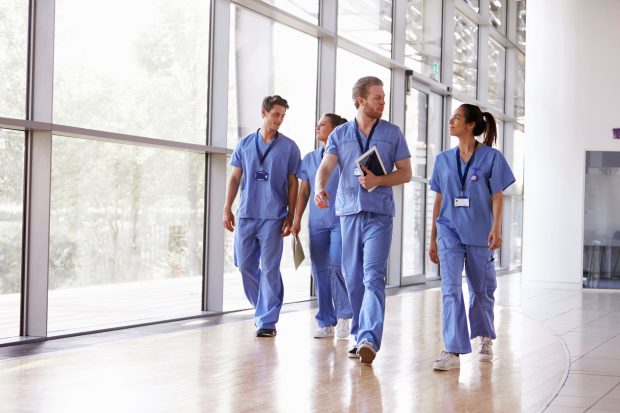
For 1 in 4 Americans, work means 8 hours sitting at a desk, probably staring at a computer screen, with little opportunity for activity. While such sedentary jobs can take their toll on the mind and body, workers who spend long periods on their feet have their own set of challenges to overcome. Paramedics, nurses, patrol officers, maintenance workers, firefighters, and high school teachers, are just a few of the professions working long shifts where most of their time is spent standing or walking.
You can’t control the nature of your job. For instance, if you’re a nurse, you can’t opt out of 12-hour shifts or insist on sitting down every time you need a rest. But there are some simple steps you can take to look after yourself on long, physically strenuous shifts. From investing in a comfortable work uniform to treating your feet to a massage, we’ve put together our top tips for staying healthy if you work on your feet all day.
Invest in Comfortable Shoes
Your work may require you to abide by a dress code to maintain a professional look. However, this doesn’t mean you need to endure the pain of wearing uncomfortable footwear for long shifts. If you’re waiting tables and your boss requires you to wear smart black office-style shoes, seek out those with a low heel, rubberized sole (for grip) and a good level of cushioning. It’s perfectly possible to look the part and feel comfortable. Make sure you pick the correct size too — 12-hours is a long time to suffer the pain of pinched toes or sore heels and shoes that are too big or too small will cause discomfort. If you’re shopping online, check out the manufacturer’s sizing chart before ordering. Perhaps order several sizes and return the ones that don’t fit.
If you’re lucky enough to work in a role with less emphasis on the appearance of your work uniform and more of a focus on comfort and safety, invest in nursing shoes or similar. These generally provide the comfort and support of sneakers but have a smarter appearance. Despite their name, nursing shoes and clogs are a great choice for people in a variety of professions who spend long periods on their feet.
Stretch Your Feet and Legs Regularly
Even if you work long shifts with sporadic breaks, you will likely have the opportunity to do some low-level exercises and stretches while at work. Some stretches can be done in minutes, without other people even being aware of what you’re doing. A calf raise can be great for stretching out tired legs. Simply stand on your toes and balance for 10 seconds (one foot at a time).
When you do get a break, try out some simple yoga moves to stretch all parts of your body. You may immediately think about your poor tired feet and legs, but many people suffer from back pain if they spend long periods walking or standing. Back pain is even more likely if your role requires you to do frequent lifting — for example, if you are a construction site worker who lifts heavy building materials or a nurse who needs to move patients. There are plenty of yoga moves to stretch out your back, and you don’t need huge amounts of space or fancy equipment.
If you plan on doing some stretching at work, consider this when choosing your work uniform. Pants that have an elasticated waist and allow freedom of movement are a great choice. For some people — for example, those working in the medical profession — your work uniform is already designed for this. Scrubs clothing generally comprises a loose-fitting tunic top and elasticated pants. There are even “yoga scrub pants.” If your role does not provide a uniform, you can still select smart workwear that allows you the necessary freedom of movement to perform a few stretches or yoga poses at work.
Pamper Yourself When You Get the Chance!
Just as workers in sedentary roles need to keep active, employees who are on their feet all day need to make time for relaxation. When you do get a break, spend it wisely. Do a few stretches then put your feet up and allow your body to rest.
After work, treat yourself to a back or foot massage. If seeking professional treatment is beyond your budget, ask someone at home to spend a few minutes massaging your back or allow yourself 5-minutes to rub your own sore feet. Taking this time out to look after yourself can have a positive effect on your body and your mind. Some other great ways to pamper sore feet include foot spas, pedicures and even rubbing away dead skin with a pumice stone.
Give Compression Socks a Try
Compression socks may not be the most glamorous item in your closet, but they can be a lifesaver for anyone who spends long periods standing or walking at work. These socks have been specially designed to increase blood circulation and improve the flow of oxygen through the body. This reduces soreness by preventing a build-up of lactic acid in the muscles. Compression socks also reduce leg swelling. If you’re on your feet for 12-hours at a time, you’ll be no stranger to swollen legs and feet. Massaging swollen feet can help, but why not prevent the swelling in the first place?
A common complaint of restaurant workers, hospital staff and people in other professions that require standing for long periods, is the dreaded varicose and spider veins. These unsightly and uncomfortable blue veins can be avoided, or at least reduced, by the regular wearing of compression socks.
If your fashion sense makes you reluctant to give compression socks a try, dispel the image of the beige freebies dished out by some airlines or provided by your doctor. Compression socks are now widely available in a wide range of pretty prints and fun designs.
Prevention Is Better Than Cure
Life gets busy, and it’s easy to bump your wellbeing way down the list of priorities in the face of conflicting demands. But if your health suffers, you’ll soon struggle to keep on top of work and home life, so it’s important to plan and stay healthy at work. Think about your typical day and build a routine that factors in a little “you time” both in and outside of work. Pack your work uniform the night before and be sure to include comfortable shoes, clothes you can stretch in, and compression socks to prevent swelling and soreness.
It’s much more effective to prevent aches, pains, and injury than trying to undo the damage. When sore feet and tired legs are unavoidable, make sure you treat yourself to a little post-work pampering to ensure you stay healthy and fit enough to work and to enjoy life!









![Daily Bite [Make]: Philly Cheesesteak Stuffed Bell Peppers](https://dashofwellness.com/wp-content/uploads/2013/01/Philly-Cheesesteak-Stuffed-Pepper-Daily-Bite-1-100x70.png)
